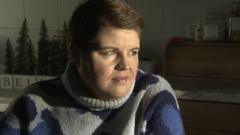In the Republic of Ireland, a nation celebrated for its economic strides, a significant discontent lingers among its citizens, especially as general elections draw near. Emma, a mother of four from County Donegal, finds herself awake at night contemplating her children's medical needs, highlighting a troubling disconnect between economic indicators and personal experiences.
"I hear we are one of the richest countries in the world," she shares, "but I don't see it." Emma's frustration reflects a broader sentiment among the electorate. While recent financial reports indicate a budget surplus of €25 billion ($27 billion) and promises of direct payments to households, many citizens feel neglected. Health care systems, in particular, are under scrutiny, with lengthy waiting lists for specialists, leaving families like Emma's grappling with inadequate access to care.
In Donegal, local journalist Áine Ní Bhreisleáin weighs in, emphasizing visible cost-of-living increases that overshadow the positive economic narratives. "We're being told that things are better in Ireland," she observes, "but people can see the cost of living is rising and rising."
This perception of being overlooked extends beyond health care. Infrastructure issues and substandard housing conditions plague the region, which is notorious for its political isolation from Dublin, the heart of government. Donegal appears "forgotten," as canvassing efforts face challenges due to its vastness and residents' growing sentiments of disconnection.
Housing has become another focal point of concern, worsened by a soaring price market and a staggering waiting list for social housing. A recent report indicates a pressing need for at least 35,000 new homes annually to meet rising demand. The influx of approximately 150,000 immigrants last year—an unprecedented figure—adds further strain, with many residents in Donegal expressing worries over perceived inequities in the prioritization of services.
Local radio host Greg Hughes articulates discontent, suggesting that residents feel disenfranchised due to a lack of tangible government action on longstanding issues. The sentiment is clear: many in Donegal, and across Ireland, echo a collective frustration marked by the stark divide between reported national prosperity and local realities.
As parties vie for power in the upcoming election, the ruling coalition aims to maintain its position while Sinn Féin hopes to emerge as the largest party. Voter sentiment indicates a critical moment on the horizon, where voices demanding authenticity and real change could reshape Ireland's political landscape.
With nearly a quarter of candidates running as Independents, the electorate's desire for action and accountability resonates loudly, making it evident that economic statistics alone cannot quell the rising dissatisfaction felt by so many within the nation.





















